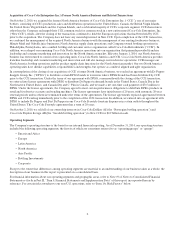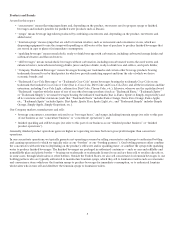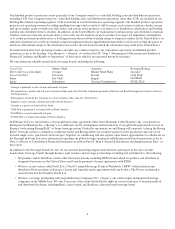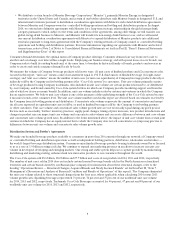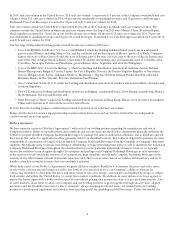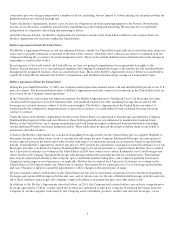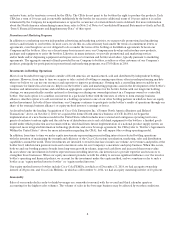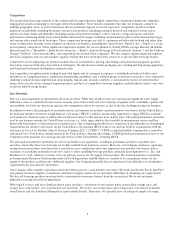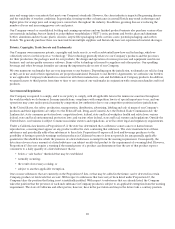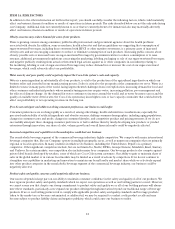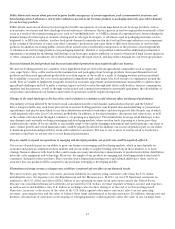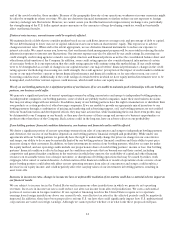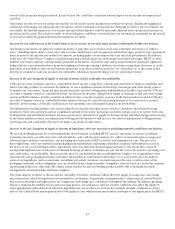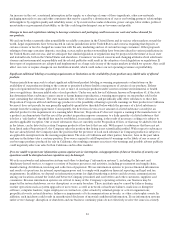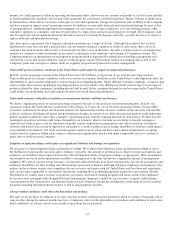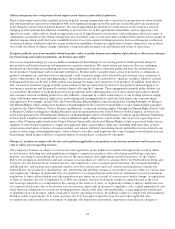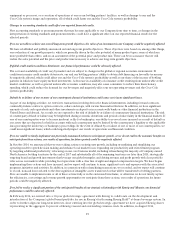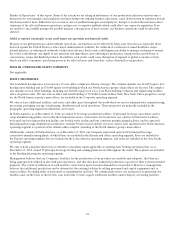Coca Cola 2014 Annual Report Download - page 14
Download and view the complete annual report
Please find page 14 of the 2014 Coca Cola annual report below. You can navigate through the pages in the report by either clicking on the pages listed below, or by using the keyword search tool below to find specific information within the annual report.12
ITEM 1A. RISK FACTORS
In addition to the other information set forth in this report, you should carefully consider the following factors, which could materially
affect our business, financial condition or results of operations in future periods. The risks described below are not the only risks facing
our Company. Additional risks not currently known to us or that we currently deem to be immaterial also may materially adversely
affect our business, financial condition or results of operations in future periods.
Obesity concerns may reduce demand for some of our products.
There is growing concern among consumers, public health professionals and government agencies about the health problems
associated with obesity. In addition, some researchers, health advocates and dietary guidelines are suggesting that consumption of
sugar-sweetened beverages, including those sweetened with HFCS or other nutritive sweeteners, is a primary cause of increased
obesity rates and are encouraging consumers to reduce or eliminate consumption of such products. Increasing public concern about
obesity; possible new or increased taxes on sugar-sweetened beverages by government entities to reduce consumption or to raise
revenue; additional governmental regulations concerning the marketing, labeling, packaging or sale of our sugar-sweetened beverages;
and negative publicity resulting from actual or threatened legal actions against us or other companies in our industry relating to
the marketing, labeling or sale of sugar-sweetened beverages may reduce demand for or increase the cost of our sugar-sweetened
beverages, which could adversely affect our profitability.
Water scarcity and poor quality could negatively impact the Coca-Cola system’s costs and capacity.
Water is a main ingredient in substantially all of our products, is vital to the production of the agricultural ingredients on which our
business relies and is needed in our manufacturing process. It also is critical to the prosperity of the communities we serve. Water is a
limited resource in many parts of the world, facing unprecedented challenges from overexploitation, increasing demand for food and
other consumer and industrial products whose manufacturing processes require water, increasing pollution, poor management and
the effects of climate change. As the demand for water continues to increase around the world, and as water becomes scarcer and the
quality of available water deteriorates, the Coca-Cola system may incur higher costs or face capacity constraints that could adversely
affect our profitability or net operating revenues in the long run.
If we do not anticipate and address evolving consumer preferences, our business could suffer.
Consumer preferences are evolving rapidly as a result of, among other things, health and nutrition considerations, especially the
perceived undesirability of artificial ingredients and obesity concerns; shifting consumer demographics, including aging populations;
changes in consumer tastes and needs; changes in consumer lifestyles; and competitive product and pricing pressures. If we do not
successfully anticipate these changing consumer preferences or fail to address them by timely developing new products or product
extensions through innovation, our share of sales, volume growth and overall financial results could be negatively affected.
Increased competition and capabilities in the marketplace could hurt our business.
The nonalcoholic beverage segment of the commercial beverage industry is highly competitive. We compete with major international
beverage companies that, like our Company, operate in multiple geographic areas, as well as numerous companies that are primarily
regional or local in operation. In many countries in which we do business, including the United States, PepsiCo is a primary
competitor. Other significant competitors include, but are not limited to, Nestlé, DPSG, Groupe Danone, Mondele
-z, Kraft, Suntory
and Unilever. In certain markets, our competition also includes major beer companies. Our beverage products also compete against
private label brands developed by retailers, some of which are Coca-Cola system customers. Our ability to gain or maintain share of
sales in the global market or in various local markets may be limited as a result of actions by competitors. If we do not continue to
strengthen our capabilities in marketing and innovation to maintain our brand loyalty and market share while we selectively expand
into other product categories in the nonalcoholic beverage segment of the commercial beverage industry, our business could be
negatively affected.
Product safety and quality concerns could negatively affect our business.
Our success depends in large part on our ability to maintain consumer confidence in the safety and quality of all of our products. We
have rigorous product safety and quality standards which we expect our operations as well as our bottling partners to meet. However,
we cannot assure you that despite our strong commitment to product safety and quality we or all of our bottling partners will always
meet these standards, particularly as we expand our product offerings through innovation beyond our traditional range of beverage
products. If we or our bottling partners fail to comply with applicable product safety and quality standards and beverage products
taken to the market are or become contaminated or adulterated, we may be required to conduct costly product recalls and may
become subject to product liability claims and negative publicity, which could cause our business to suffer.


